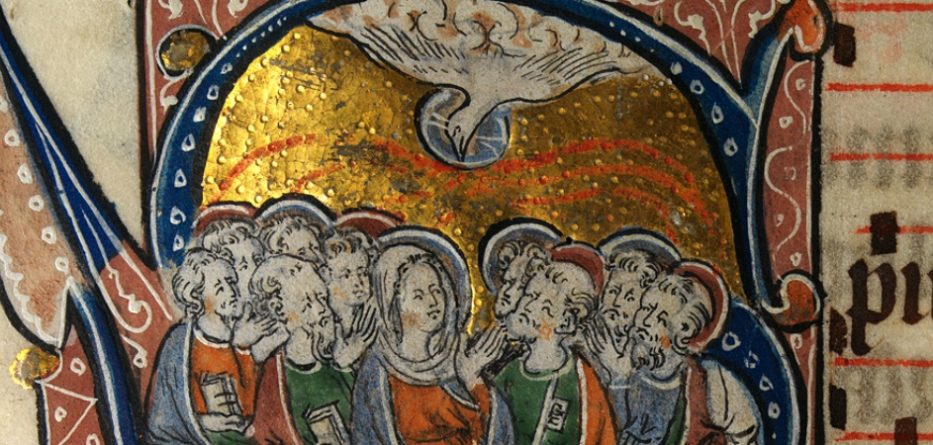Homily for Pentecost Sunday 2021
Readings: Acts 2:1-11, Gal 5:16-25; John 15:26-7, 16:12-15
23 May 2021
Today we celebrate Pentecost, 50 days on from Easter. Jews this past week have celebrated Shavuot, the Feast of Weeks, commemorating the first wheat harvests in the Land of Israel as well as the anniversary of the giving of the Torah at Mount Sinai in the year 1312 BCE.
The promise and hope of Pentecost is that in the midst of all our diversity, we can understand each other. We can communicate across barriers and we can be heard. In the preface at Mass today we pray:
For bringing your Paschal Mystery to completion,
you bestowed the Holy Spirit today
on those you made your adopted children
by uniting them to your Only Begotten Son.
This same Spirit, as the Church came to birth,
opened to all peoples the knowledge of God
and brought together many languages of the earth
in profession of the one faith.
Listen at https://soundcloud.com/frank-brennan-6/pentecost-sunday-2021
Six years ago, Pope Francis chose Pentecost Sunday as the day to sign his encyclical Laudato Si’: On Care for our Common Home. Francis was wanting to build on the unity in diversity, and the hope in the midst of despair of the Church at Pentecost to help provide unity in diversity and hope in the midst of despair in our world while we confront the challenges of pollution and climate change, water shortages, loss of biodiversity, global inequality, breakdown in society, and decline in the quality of human life. Francis saw the need for united concerted action by the whole of humanity in all our diversity. Last year on 24 May, he invited us to mark the fifth anniversary of the encyclical by reflecting, praying and acting on the encyclical’s key messages during the course of the year to come. As if that wasn’t enough, he then proclaimed this present week as Laudato Si’ Week 2021, running from May 16-25, to be the crowning event of the Special Laudato Si’ Anniversary Year, and a celebration of the great progress the whole Church has made on its journey to ecological conversion, also being a time to reflect on what the COVID-19 pandemic has taught us so that we might prepare for the future with hope. Francis said, ‘I renew my urgent call to respond to the ecological crisis. The cry of the Earth and the cry of the poor cannot continue. Let’s take care of creation, a gift of our good Creator God.’
We are well used to special days, weeks and years being allocated for all manner of worthy causes. After a while, they tend to merge in our consciousness. Whether it’s the pope, the United Nations or our governments declaring these special days, weeks and years, the celebrations, commemorations and key messages tend to wash over us, inviting notional individual assent and symbolic commitment by institutions but not too much real action or fundamental change of heart. We’re used to the occasional homily on the contemporary pope’s main encyclicals, but not much more than that. It makes sense to revisit Laudato Si’ specifically in the light of today’s feast, the sending of the Spirit at Pentecost.
In the Sequence at Mass today we pray:
Come, Holy Spirit, come!
Heal our wounds, our strength renew;
On our dryness pour your dew;
Wash the stains of guilt away;
Bend the stubborn heart and will;
Melt the frozen, warm the chill;
Guide the steps that go astray.
Is a government sponsored gas-fired power station a good idea? What’s the long term political effect of the weekend by-election in the Hunter Valley? What’s the real significance of this week’s report from the International Energy Agency entitled Net Zero by 2050: a Roadmap for the Global Energy Sector? Is the report just more preaching to the converted, confirming the climate skeptics in their cynicism and resignation that nothing can be done to reverse what is inevitable? The report sets out milestones to guide the global journey to net zero by 2050. These milestones include ‘no investment in new fossil fuel supply projects, and no further final investment decisions for new unabated coal plants’, no sales of new internal combustion engine passenger cars after 2035, and the global electricity sector reaching net-zero emissions by 2040.[1]
As Christians filled with the Holy Spirit this day of Pentecost, we do not have the ready answers to hand. We are not all agreed. It’s not as if all of us – Parthians, Medes, Elamites, inhabitants of Mesopotamia, Judea and Cappadocia – are going to sign up immediately to the International Energy Agency’s report. But as Pope Francis says in Laudato Si’: ‘The Spirit of God has filled the universe with possibilities and therefore, from the very heart of things, something new can always emerge.’[2] He also says, ‘Yet God, who wishes to work with us and who counts on our cooperation, can also bring good out of the evil we have done.’ He goes on to quote his predecessor Pope John Paul II who said, ‘The Holy Spirit can be said to possess an infinite creativity, proper to the divine mind, which knows how to loosen the knots of human affairs, including the most complex and inscrutable.’[3]
We know that we still have a long way to go in the politics and economics of climate change. We no more expect agreement amongst Catholics on the politics and economics than we do amongst people generally. But we should hope and pray that the gifts of the Spirit can sustain and inspire us as we contemplate our personal, communal and institutional responses to these challenges which are local and global. As Paul tells the Galatians in today’s second reading: ‘the fruit of the Spirit is love, joy, peace, patience, kindness, generosity, faithfulness, gentleness, self-control’. We can all identify the shortfall in the availability of these fruits in our civic discourse amidst the political argy-bargy of climate change. These fruits are not excuses for inaction or the failure to take on those of contrary opinions. These fruits are the way forward.
In Laudato Si, Pope Francis tells us: ‘The Father is the ultimate source of everything, the loving and self-communicating foundation of all that exists. The Son, his reflection, through whom all things were created, united himself to this earth when he was formed in the womb of Mary. The Spirit, infinite bond of love, is intimately present at the very heart of the universe, inspiring and bringing new pathways’.[4]
Seeking new pathways while we conclude the Laudato Si’ Anniversary Year and Laudato Si’ Week, let’s pray with Francis his Christian Prayer in union with creation:[5]
Holy Spirit, by your light
you guide this world towards the Father’s love
and accompany creation as it groans in travail.
You also dwell in our hearts
and you inspire us to do what is good.
Praise be to you!
Fr Frank Brennan SJ is the Rector of Newman College, Melbourne, the Distinguished Fellow of the PM Glynn Institute, Australian Catholic University, and the former CEO of Catholic Social Services Australia (CSSA).
[1] See https://www.iea.org/news/pathway-to-critical-and-formidable-goal-of-net-zero-emissions-by-2050-is-narrow-but-brings-huge-benefits-according-to-iea-special-report
[2] Pope Francis, Laudato Si’, #80
[3] John Paul II, Catechesis (24 April 1991), 6: Insegnamenti 14 (1991), 856.
[4] Pope Francis, Laudato Si’, #238
[5] Ibid, #246








